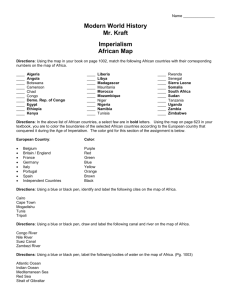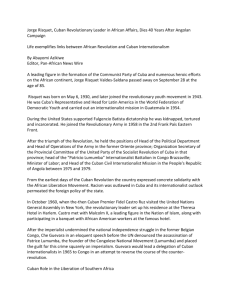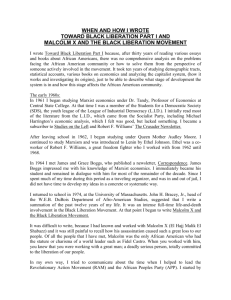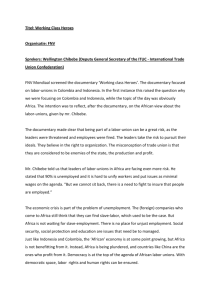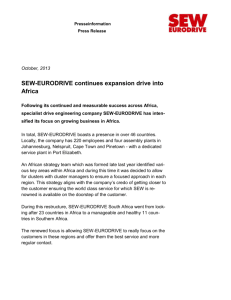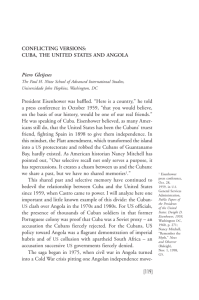CUBA An African Odyssey - Parliamentary Millennium Project
advertisement
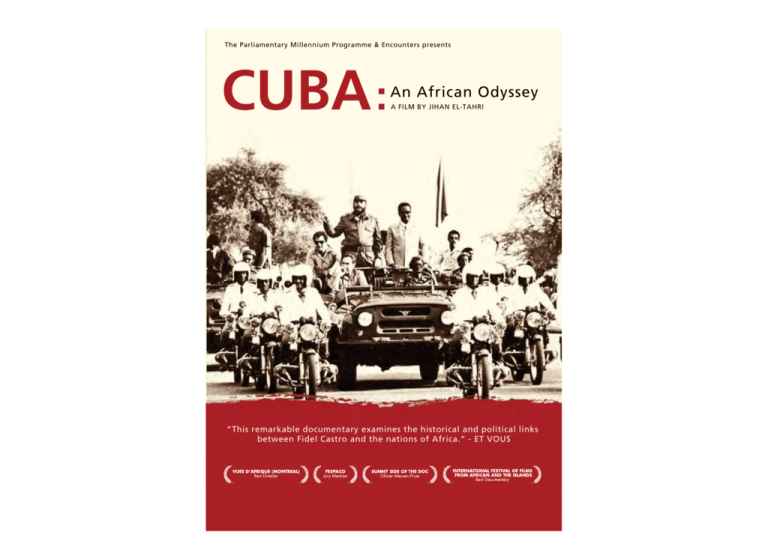
The Parliamentary Millennium Programme & Encounters presents CUBA : An African Odyssey A FILM BY JIHAN EL-TAHRI “This remarkable documentary examines the historical and political links between Fidel Castro and the nations of Africa.” - ET VOUS What price are you willing to pay for someone else’s freedom? In answer to this, tens of thousands of young men and women from the small Caribbean Island of Cuba answered “Whatever is required!” For more than twenty years, during a time when most African countries were still under the yoke of colonialism, Cuban revolutionaries were actively involved in liberation wars across Africa. These descendants of former African slaves died in their thousands on African soil to ensure freedom from apartheid-style oppression of ordinary Africans across the Continent. In answering the call for global solidarity and justice these sons and daughters of Cuba not only changed the world as they knew it, but became living proof of the positive power of internationalism. A TIME TO REMEMBER? In “Cuba: An African Odyssey” an Egyptian filmmaker, Jihan El-Tahri, explores how Cuba, under the leadership of Fidel Castro, gave critical support to Africa’s liberation movements. Cuban influence was instrumental in advancing the decolonization process, which brought independence to much of the continent. Ms. El-Tahri is able to convey a strong sense of what it was like to be part of these incredible events by presenting the viewer with rarely-seen archival footage and indepth interviews with those who set the course of Africa’s recent history. Her tale begins in the Congo where a young prime minister, Patrice Lumumba, is frustrated by the slowness with which Belgium’s rulers are relinquishing control of the country. Matters become worse when, four days after independence and the Belgian withdrawal, Congolese soldiers mutiny. They forcibly take control of the country and proceed to exact revenge upon their former masters. The Belgians hastily send their own troops back into the Congo in order to safeguard their citizens and their economic interests in the country. With his country re-occupied Prime Minister Lumumba needs to find help from somewhere. At this time, The Cold War is at its peak. The United States and The Soviet Union are vying for control and influence in the world. The Congo is of interest to the superpowers, particularly the United States, because it has mineral resources that the U.S. desperately needs. In dire straights, Lumumba turns to the United States for aid. He asks them to send troops to free the Congo from the Belgians, but he is refused. The Russians, however, are willing to help and Lumumba accepts their aid. In so doing he becomes an enemy of the West. The United States, is not prepared to allow the Soviets to gain control in Africa. From that point, the political carnage begins as the world powers seek to stamp their will on the African country. Lumumba is assassinated and a revolt is launched against his American-backed successor. At this point Fidel Castro has only recently secured the liberation of Cuba, but he sees the struggle in Africa as an extension of his own. He decides that Cuba must do what it can to aid the forces of liberation on the African continent. The Congo is the first recipient of Cuban military aid. The documentary reveals the incredible story of how Castro’s co-commander and friend, Che Guevara, leads a small band of Cuban troops into Congo to help the rebels. The film tracks their efforts and the reasons for their ultimate failure in Congo and reveals how this setback leads Castro to adopt new tactics in Africa. It then moves to the fascinating case of Guinea-Bissau, where Cuba’s aid is finally vindicated by helping Amilcar Cabral bring the Portuguese to the negotiating table, an event that would lead to the collapse of Portuguese rule in Africa. A WORLD OF DIFFERENCE? Chief among Portuguese possessions was Angola, a country that contained massively valuable natural resources. Ms. El-Tahri devotes the second part of her film to the road to independence there, a road covered in blood. Three different liberation movements had arisen against Portuguese rule in Angola. Two of those, the National Union for the Total Independence of Angola (UNITA) and the National Liberation Front of Angola (FNLA) were backed by the United States. The third was the Popular Movement for the Liberation of Angola (MPLA), a socialist movement that enjoyed the support of Russia and Cuba. Once the Portuguese agreed to leave the country, each rebel leader wanted to seize power for himself. A Civil War erupted. MS BR OT HE RS IN AR The war escalated massively as foreign powers became involved. The United States and the Apartheid regime in South Africa did not want the MPLA to assume power in Angola. They feared that if one African country became communist, others would follow. Russia, on the other hand, did not want to see a government sympathetic to the US in control of Angola. They sent advisers and weapons and other indirect aid but they did not send troops to the country. Outmatched, the MPLA was being crushed when it appealed for help from Cuba. Castro immediately sent aid. In addition to weapons and money, Castro sent his special forces and 35 000 foot soldiers to support the MPLA in Angola. With the help of the Cubans, the MPLA was able to seize the Capital, Luanda, and assume control of the country at the time independence came into effect on 11 November 1975. Nevertheless, the civil war continued. The documentary proceeds to show how, as stalemate on the battlefield sets in, peace talks commenced between the international disputants. The complicated diplomatic process is based on linking South African withdrawal from Namibia to the departure of Cuban troops from Angola. The formula finally results in ending both the South African occupation of Namibia and the protracted war in Angola. The departure of Cuban troops opened a new era of freedom in Southern Africa. Ms El-Tahri presents us with the question of why Nelson Mandela has respect for Fidel Castro, a man who has been demonized by the West. Her documentary reveals that CHE GUE VAR A behind the layers of propaSIT TIN G ON TOP OF THE WOR LD ganda there lies a Castro whose battle was that of national independence and ridding nations of colonialism. Internationalism, or the solidarity of the weak, was a strategy he used in the fight against colonialism. We must always remember that a film is an edited story. The filmmaker has to present the information in a way that guides the viewer’s perception and understanding of events. This is also true of all historical sources. Each has its own strengths and each presents its own version of events. Film however, is a uniquely persuasive medium and it is important to remember, when watching this film, that Ms El-Tahri’s viewpoint is being presented. Her viewpoint is certainly wellresearched and valid, but it is our hope that the film will spark enough interest in these amazing events that our viewers will investigate them further and arrive at a viewpoint they can call their own. THE PARLIAMENTARY MILLENNIUM PROGRAMME – COMMEMORATION OF THE 20TH ANNIVERSARY OF THE BATTLE OF CUITO CUANAVALE The Parliamentary Millennium Programme (PMP) is the South African Parliament’s primary nation-building and heritage programme. Through the PMP, Parliament seeks to explore various initiatives aimed at getting South Africans talking about important issues, both historical and contemporary, that give expression to South Africa’s quest to ensure unity in diversity. The role, values such as internationalism played in shaping the path that we, as a nation, traversed to national liberation was identified as a critical imperative for debate. The Battle of Cuito Cuanavale (1988) was accordingly identified as a prime example of how the commitment to the values of internationalism, global solidarity and social justice contributed to the liberation of South Africa and our neighbouring countries. This Battle took place during 1987 and 1988 in a remote corner of Angola, shielded from the international media and therefore largely went unreported. The town of Cuito Cuanavale suffered under siege from the apartheid Defence Force and its Angolan allies for over ten months in one of the biggest, and what turned out to be the last battles of the Cold War. The outcome of the Battle irreversibly changed the history and political landscape of the Southern African region. At this previously insignificant Angolan village Angolan, Namibian and Cuban forces managed to bring the military aggression of the South African apartheid forces to a halt. At the same time, South African liberation soldiers of Umkhonto we Sizwe fighting in Northern Angola, managed to contain the Angolan rebels, allied to the apartheid regime, preventing them from reinforcing the apartheid forces in the south. The peace negotiations that followed the Battle led to the withdrawal of the South African military forces from Angola and Namibia, resulting in the independence of Namibia, and spurring on South Africa’s negotiated settlement. Throughout this year the South African Parliament, in partnership with the Parliaments of Angola, Namibia and Cuba, as well as, civil society organizations, military veterans’ organizations and academic institutions will run various initiatives to commemorate the 20th Anniversary of the Battle of Cuito Cuanavale. The PMP’s partnership with the producers of Cuba: an African Odyssey is one such initiative. This documentary provides an in-depth analysis of the role that Cuba played in African liberation struggles. The various interviews with individuals on both sides of the erstwhile Cold War divide, coupled with unique archival footage, are seen as critical resources that the public may use to explore and understand significant events in our liberation history. It is hoped that by screening this documentary debate and dialogue will be encouraged on the importance of internationalism, both then and now. Encounters: The South African International Documentary Film Festival is the foremost documentary film festival in Africa,promoting documentaries through distribution and special screenings. To buy dvds or arrange for screenings contact: Nazeer Ahmed Encounters South African International Documentary Film Festival Physical Address : 1st Floor , 27 Caledon Street, Cape Town, 8000 South Africa Tel: +27 21 465 4686 Fax: +27 21 461 6964 www.encounters.co.za PARLIAMENTARY MILLENNIUM PROGRAMME www.pmpsa.gov.za www.encounters.co.za
